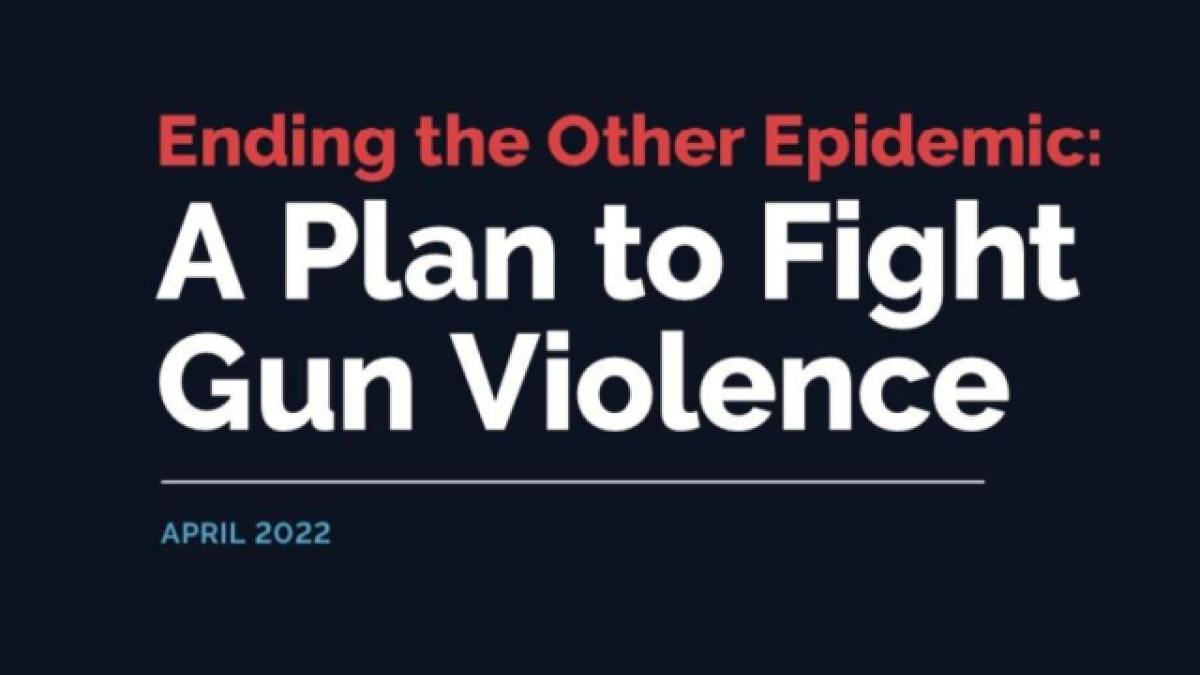Evans Announces $51 Billion, 7-Point Plan to Fight Gun Violence

PHILADELPHIA (April 21, 2022) – Congressman Dwight Evans (D-Pa.-3rd) today announced his more than $51 billion, seven-point plan to fight gun violence in Philadelphia and around the country. Evans unveiled his plan at Temple University Hospital, which treats many of the city's gun violence victims. The plan is available online at evans.house.gov.
"Over the last two years, Philadelphia and communities across America have suffered from a surge in gun violence – a second epidemic. This is a national problem – it is not just happening here. I have co-sponsored and voted for legislation in Congress, but I wanted to look for ways to do more. This epidemic of gun violence demands an all-hands response – federal, state and local government – and more community involvement. We must use all the tools in the toolbox to save lives!" Evans said.
"I am thankful to Congressman Evans and his ongoing partnership in responding to the gun violence crisis in Philadelphia, said Mayor Jim Kenney. "It is essential that we have allies at all levels of government who are prioritizing gun violence and who will advocate on our behalf in Washington. Gun violence prevention continues to be our administration's top priority, and the Congressman's Plan is another step in the right direction towards coordination, not just citywide, but state and nationwide."
State Sen. Art Haywood, D-Phila./Montgomery, said, "I support this plan by Congressman Evans. We must collaborate to fight gun violence in Philadelphia. We are all accountable."
Michael Young, CEO, Temple University Health, said, "Congressman Evans' leadership on the prestigious Ways and Means Committee has been invaluable, not only to Temple Health, but to the entire Mid-Atlantic region where he works across the aisle to develop legislative solutions and to bring resources to our region. Throughout his years of public service, Congressman Evans has been a strong partner with Temple University Hospital—which is no surprise, given that his first paid job was working at a hospital. He has also been a fierce advocate for public safety. Over the past six months, he has worked with hospitals, universities and other research organizations, social services providers, local government agencies, and various other stakeholders to develop solutions to the gun violence epidemic and to make our communities safe and vibrant."
To develop the plan, Evans and staff spent several months holding roundtables with victim advocates, academic researchers, local youth outreach groups, local organizations that support employment opportunities for at-risk youth and adults, elected officials, and representatives of local hospitals.
Evans' plan containsseven key recommendations:
- Encourage use of evidence-based strategies by local law enforcement agencies.
- Invest $1 billion in federal funding in local police departments to increase clearance levels for fatal and non-fatal shootings. This would be done through the VICTIM Act that he is co-leading with Congresswoman Val Demings, the former police chief of Orlando, Fla.
- Invest $40 billion in employment and workforce development agencies and organizations – "Initiatives such as summer youth jobs programs and employment assistance for adults are important in reducing gun violence," Evans said.
- Invest $5 billion in community-based violence intervention initiatives - The House-passed version of the Build Back Better Act that Evans voted for includes this funding.
- Increase resources for the federal agencies that can work together to reduce gun violence – the Bureau of Alcohol, Tobacco, Firearms and Explosives (ATF), the Federal Bureau of Investigation (FBI), the Drug Enforcement Administration (DEA) and the U.S. Marshals Service.
- Invest $5 billion to reduce blight and improve city environments – "Greening vacant lots, increasing the number of streetlights, and providing a grant program for low-income homeowners to make housing repairs have all been shown to reduce gun violence," Evans said.
- Increase coordination and collaboration of federal, state, and local agencies and organizations – "Organizations and agencies often work in silos, even if they provide similar services. the Hub model was created in Canada and has been adapted for use in Philadelphia. However, for this model to work most effectively, it needs the buy-in and participation of all relevant agencies and organizations, as well as more avenues for funding to increase personnel," Evans said.
Evans was also joined by state Sen. Sharif Street, D-Phila.; Special Agent in Charge Matthew Varisco, Philadelphia Field Division, U.S. Bureau of Alcohol, Tobacco, Firearms and Explosives (ATF); Dr. Amy Goldberg, dean, Temple University Lewis Katz School of Medicine; and Marla Davis Bellamy, of Philadelphia CeaseFire, Temple University Lewis Katz School of Medicine, and Temple's university-wide task force on gun violence.
Evans represents Pennsylvania's 3rd Congressional District, which includes Northwest and West Philadelphia and parts of North, South, Southwest and Center City Philadelphia. During Evans' first five years in Congress, his office has helped to return to or save more than $25 million for Philadelphians from federal agencies such as the IRS, Social Security Administration and Department of Veterans Affairs. His website is evans.house.gov and his social media handle is @RepDwightEvans on Facebook, Twitter and Instagram.
###